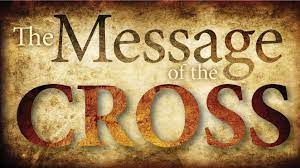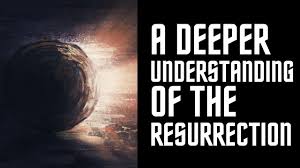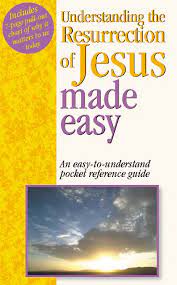
Am I foolish?
Have you ever been accused of being foolish? I remember as a child when I would do something that rejected what I knew was the right action, my mother would ask me, “why would you be so foolish?” It was my mother’s responsibility to correct and redirect me, especially if my choices were leading me in the wrong direction. That was the Apostle Paul’s intent when he pinned 1 Corinthians 1:18.
For the message of the cross is foolishness to those who are perishing, but to us who are being saved it is the power of God.
My paraphrase is this:
Unbelievers think that the belief that Jesus Christ died and rose again is stupid and irrational. But to us, who are believers and followers of Christ, it shows the awesome power of God.
The definition of foolish is to lack good sense or judgment. It is something that is unwise. My question to you is this. Is the message of the Cross foolishness?
What is the Message of the Cross?
As we read our bibles, it’s important to know that in most contexts, the “message of the Cross” is the same as “the gospel”. Last week, I shared a description of the gospel message.
We believe Christ has paid the price and penalty for our sins. Jesus was crucified, dead and buried. He rose from the grave victorious over sin and death. Jesus the Christ is now ascended to heaven and sits exalted at the right hand of God the Father. We too have been raised with Him and will spend eternity with Him.
Do we really understand what the gospel message means? If we relate to it only on Easter/Resurrection Sunday, we are missing “the power” of the Cross. It is more than a story about a piece of wood on which Christ was crucified. It is the power to save (Rom. 1:16). In addition, it represents the power behind the Cross, God Himself.
Why is the message seen as foolishness?
The Apostle Paul’s letter to the church at Corinth responds to several doctrinal questions about their new faith. In 1 Cor. 1:18-2:5, he takes time to address what the Cross (the gospel message) means.
Christ’s resurrection is the demonstration of God’s power and wisdom. This power is revealed in His victory over both sin and death. His wisdom is seen in His eternal plan of redemption for lost man.
Who considers the message of the Cross as foolishness in the 21st century? Those “who are perishing”. These are individuals who seek pleasure in the things of this world versus the things of God. The current worldview is grounded in the message of self: self-indulgence and self-gratification. Media and marketing entice them to satisfy (versus abstain from) their fleshly lusts (1 John 2:16,17). These individuals are unwilling to give up lifestyles and habits that conflict with living a Christ-centered life.
At the heart of this disbelief is Satan. He blinds people from seeing the glorious blessings and promises available to them through the Cross (2 Cor. 4:3,4). Furthermore, without the presence of the Holy Spirit, unbelievers are unable to understand the truth revealed in the message (1 Cor. 2:14-16).
Without Jesus, unbelievers remain in their sin and spiritual blindness. However, their disbelief does not nullify the reality and the truth of the Cross (The Gospel). The message of the Cross silences Satan.
The believer’s view of the message
Belief in the message begins at the Cross (Eph. 1:11-13). We are those “who are being saved”. The verb “saved” is in the present passive tense, which means this.
“Present” means that the work of salvation is continuous. We were initially saved when we first accepted Jesus as our Savior. We are now being saved as we daily walk in submission to the Holy Spirit. This enables us to resist sin’s presence as we live in our fleshly bodies. As we do this, we become conformed to the image of Christ (Rom. 8:29). We will celebrate our glorified salvation when we transition to heaven.
“Passive” means that we are recipients (versus participants) of the work of salvation. This “heavy lifting” is accomplished only by the Triune God—God the Father, Jesus Christ the Son, and the Holy Spirit. “To us who are being saved it (the Cross-the message of the Cross-the Gospel) is the power of God to them that believe.”
When we accept Jesus as our Lord and Savior, we become new creatures (2 Cor. 5:17). Our focus shifts from what we want, to what God wants (1 Pet. 4:1,2). We live “in the presence of, under the authority of, and to the honor and glory of God.”
Moving forward
It is the gospel message, the message of the Cross, that gives us both confidence and boldness, to operate in this fallen world. When we are challenged for our beliefs, we know who we are and whose we are (Rom. 8:16-17). “We are a chosen people. We are royal priests, a holy nation, God’s very own possession. As a result, we can show others the goodness of God, for he called us out of the darkness into his wonderful light.” (1 Pet. 2:9, NLT).
Whenever I read 1 Corinthians 1:18, my mind returns to my mother’s chastisement and her intent to guide me in the “right direction”. It reminds me that I must continuously remember my identity in the message of the Cross (Rom. 10:9-11).
Though opposed by the current worldview, I will choose to follow Jesus Christ. I am ready to share the reason for my hope (1 Pet. 3:15). I will witness to the power and reality of the message of the Cross. Christ crucified, died, but now alive and ascended in victory. That’s not foolishness, it’s a fact.





